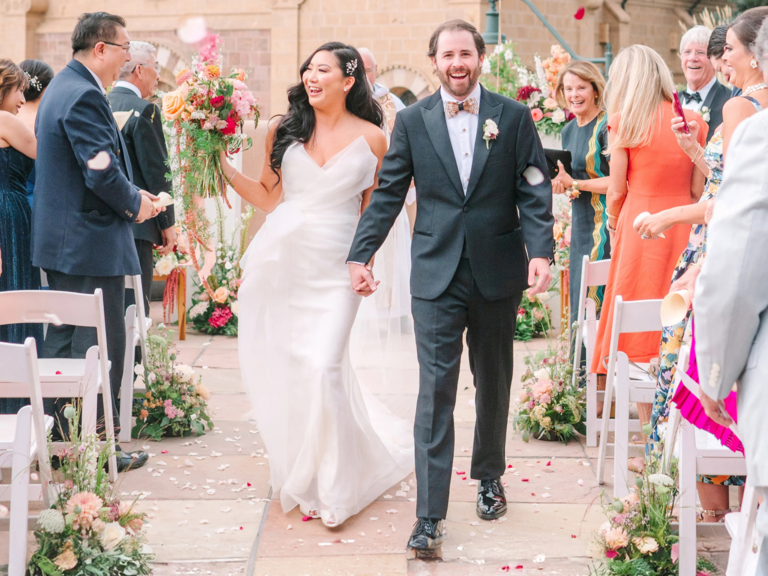What Is a Sequel Wedding? How to Determine What's Best for Your Wedding Festivities
Hosting a sequel wedding has become a popular wedding trend amongst couples for good reason. After all, it is your celebration of love and the next chapter of your life. If you want to celebrate multiple times with different (or even the same) people, that is your decision to make—and we're here to help you understand the steps you need to take to make your sequel wedding dream a reality.
To learn more about sequel weddings, their cost and tips for planning them, we tapped Tara Fay, founder of Tara Fay Events in Ireland; Irene Katzlas, owner and planner at Irene and Co Events in Bethany, Connecticut; Alexandra Madison, lead planner and owner of Alexandra Madison Weddings in Columbia, South Carolina; and Sarah Christopher, owner and lead planner of Cheers & Champagne in Myrtle Beach, South Carolina.
Sequel Wedding Planning Tips: Definition | Cost | How to Plan
What Is a Sequel Wedding?
In short, a sequel wedding means two weddings. A sequel wedding is where a couple has a smaller, more intimate ceremony (often a micro-wedding or elopement) and then has a larger ceremony or reception at a later date. Although a smaller wedding ceremony followed by a larger second wedding ceremony and reception is a common way of executing a sequel wedding, it is not a set rule and nuances (regarding event size) can be made according to the celebrated couple and their state of affairs.
When to Have a Sequel Wedding
There is no right or wrong time to plan a sequel wedding as long as it works with your (and your guests') schedule, your intentions, your wedding vision and your allotted budget. Although sequel weddings can sometimes occur consecutively within a short period, they can also occur days, weeks, months or years apart.
Many circumstances often lead couples to host a sequel wedding, with one of the main reasons being that they want to initially keep the start of their next chapter private. Some couples may do sequel weddings because they want to make their marriage official privately or in a smaller setting but still don't want to miss out on sharing the celebrations with a larger group.
Another popular reason some couples engage in a sequel wedding is to accommodate different cultures and traditions. "If your family lives in different countries or you're balancing multiple cultures, a sequel wedding can make space for everyone," Katzlas says. "Just be clear on what each event means and what matters most."
Madison notes that family dynamics can also be a consideration that leads couples to partake in a sequel wedding. Unfortunately, intense family dynamics may lead a couple to host separate celebrations. However, some sentimental family dynamics may also lead the couple to celebrate twice (or more). "In more emotional moments, I've seen couples plan two weddings because of a loved one who may not be able to travel or who they fear won't be alive for the later date," Katzias explains. "In those cases, the second celebration becomes a way to honor time and connection."
Venue sizes and destination weddings can also contribute to implementing a sequel wedding. "I see it more often when couples are hosting a destination wedding with a smaller guest count, followed by a bigger party back home," Fay adds.
How Much Does a Sequel Wedding Cost?
The cost of a sequel wedding varies depending on where you host your events, your guest count, and any vendors you hire, including your wedding venues, wedding caterers, wedding DJs and florists. Additionally, your attire (and whether or not you keep it the same) and other factors, such as travel, can affect the cost and influence how you'll fit both celebrations into your wedding budget. Luckily for you, The Knot Budget Advisor is a helpful resource to compare and contrast the average wedding costs of various vendors across the United States, as reported by couples who have recently tied the knot.
"Most sequel weddings I have helped conduct spend somewhere between $15,000 and $20,000 because they are treating it as their actual wedding reception," Christopher explains. "But you could keep it intimate and a lower guest count and still have it be cost-effective."
How to Plan a Sequel Wedding
Planning a sequel wedding requires planning for two weddings as opposed to only one. As a result, it might seem a bit overwhelming, which is why we asked our experts for tips to execute both of your celebrations as seamlessly as possible.
1. Create Your Guest List
The first thing you want to do when planning your sequel wedding is decide who will be at both celebrations. Although keeping the guest list small for your first wedding celebration is customary, it's not required—you can invite (or not invite) as many guests as you see fit. Katzias notes that you'll have a better scope of each event when you create your guest list early, which will facilitate the wedding planning process.
2. Hire a Wedding Planner
Katzias notes that hiring a wedding planner who specializes in planning sequel weddings is key, as there are typically a lot more moving parts. Fay adds that these types of wedding planners help you prioritize your wedding budget for both celebrations. That way, you can decide on what's most important to you at each one to match the aesthetics and overall celebrations you intend to host.
Specialty wedding planners often have extra expertise in connecting with different wedding vendors. Remember, a sequel wedding (depending on the circumstances) often requires different sets of vendors (which you can search for on The Knot Vendor Marketplace).
3. Select Your Venues and Dates
Whether or not you book the venues and dates for both celebrations simultaneously is up to you and your partner. That said, you want to ensure your ideal wedding venues are available and can accommodate the number of guests and any preferred decor and/or additions.
If you know or have a feeling that your second venue will be a destination or an international one, consider how much transportation will cost and whether or not it's worth reserving as early as possible to ensure it will be available on your ideal date. However, don't fret or feel any pressure to book your second celebration before you're ready. "When having your ceremony, you don't need to feel like you have to immediately rush into planning a sequel wedding," Christopher says. "Most couples take up to a year before having them."
4. Invite Your Guests
As is the case with any wedding, inviting guests is crucial, and the earlier, the better. When sending your sequel wedding invitations, wording is key as you don't want your guests to feel bad for not being invited to celebrate with you at either of your gatherings, Fay says. "Update your wedding website or include a note in the sequel wedding invitation to share why you're planning another wedding, because when people understand the why, they show up in a different way," Katzias adds.
"When I've produced a sequel wedding, the invitation wording used is usually a variation of: 'Invite you to a party to celebrate the recent wedding of…,'" Fay says.
5. Determine Intentions for Your Celebrations
What makes sequel weddings special are their nuances, which involve some prior planning and considerations to ensure both celebrations are meaningful to you and your guests. "Think about who came to the first wedding and who's coming to the second. Is it the same group or totally different? Are you planning this new celebration to include people who couldn't be there the first time? That level of intention matters," Katzias says. "I really love when couples create a quiet and private first ceremony where the focus is just on the two of them, with no outside pressure, and then open up the wedding with family and friends later on." If you're spending energy and money on planning two weddings, you'll be thankful you took the time to carefully plan them both.
























